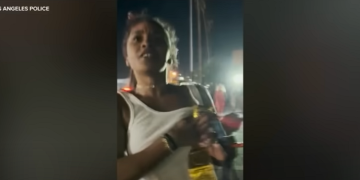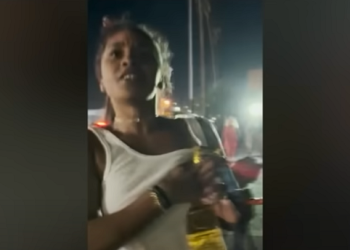After two weeks of testimony and more than a dozen witnesses, closing arguments are scheduled Monday in the federal obstruction of justice retrial of former Sheriff Lee Baca, who’s accused of orchestrating a scheme to thwart an FBI investigation into inmate mistreatment in the jails he ran and of lying to the bureau.
Baca, who ran the nation’s largest sheriff’s department for more than 15 years, faces charges of conspiracy, obstruction of justice and making false statements. If convicted of the charges, he could be sentenced to a prison term of several years.
The retired lawman was tried in December on the first two counts, and prosecutors had planned a second trial on the lying count. But a mistrial was declared after jurors deadlocked 11-1 in favor of acquitting him, and U.S. District Judge Percy Anderson combined all three counts in the retrial, which began Feb. 22.
The charges partly stem from a 2011 incident in which two sheriff’s investigators confronted an FBI agent in the driveway leading into her apartment and falsely told her they were in the process of obtaining a warrant for her arrest. Baca denies having advance knowledge of the illegal attempt to intimidate the agent.
Although the prosecution’s string of witnesses often mirrored those in the first trial, defense attorney Nathan Hochman was barred from again presenting evidence of “prior good works” related to Baca’s years as leader of the department. Anderson ruled that such evidence does not directly pertain to the charges for which he is being tried.
Hochman had also wanted the jury to hear medical testimony that Baca has been suffering from Alzheimer’s disease for years. The judge shot that down, calling such proposed testimony a “waste of time.” Baca’s attorneys contend the ex-sheriff is in the early stages of the disease and suffered some cognitive impairment as long as six years ago — a period which covers the time in April 2013 when he allegedly made false statements under oath about events two years prior.
Testimony concluded Thursday and court was dark Friday due to illness.
Baca did not take the stand. The defense rested after calling a single witness — Michael Gennaco, a former civil rights prosecutor and longtime police use-of-force consultant — who told jurors that Baca was instrumental in the creation of the Office of Independent Review, a civilian watchdog group that provided oversight of misconduct in the Los Angeles County Sheriff’s Department. He said Baca was highly supportive of the group’s endeavors.
But Assistant U.S. Attorney Brandon Fox pointed out during cross- examination that the committee was not an enforcement agency and had little power to draw back the curtains on what was occurring at the department.
Before resting his case, Fox called Andre Birotte Jr., formerly the top federal prosecutor in the region — he has since become a federal judge — to tell of a heated meeting he attended with Baca and Steven Martinez, who was in charge of the FBI office in Los Angeles at the time.
Birotte said Baca, whom he had known for years, was the most upset he had ever seen him in phone calls and meetings after the sheriff learned that FBI agents had smuggled a cell phone to the informant by bribing a corrupt sheriff’s deputy as part of an undercover sting.
“I’m the g-d-damn sheriff. These are my g-damn jails,” he quoted Baca as saying.
The jury, made up of eight men and four women with four others serving as alternates, is expected to begin deliberations in downtown Los Angeles immediately after closing arguments.
Prosecutors have sought to prove that Baca, 74, was at the heart of a scheme carried out by his subordinates to hide a federal informant from the FBI and intimidate an agent working on the case.
Nine others, including former Undersheriff Paul Tanaka, have been convicted of related charges.






















